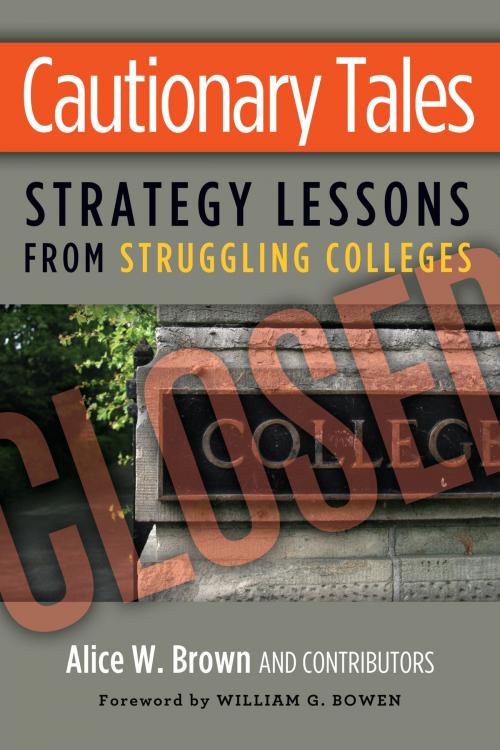Cautionary Tales
Strategy Lessons From Struggling Colleges
Nonfiction, Reference & Language, Education & Teaching, Higher Education| Author: | Alice W. Brown | ISBN: | 9781579227821 |
| Publisher: | Stylus Publishing | Publication: | January 31, 2013 |
| Imprint: | Stylus Publishing | Language: | English |
| Author: | Alice W. Brown |
| ISBN: | 9781579227821 |
| Publisher: | Stylus Publishing |
| Publication: | January 31, 2013 |
| Imprint: | Stylus Publishing |
| Language: | English |
Scarcely a week goes by without a headline about the unsustainability of higher education as we know it, under threat from new models, for-profits, or online education. Most threatened are small liberal arts colleges – with commentators predicting the demise of colleges with fewer than 1,000, or even 1,500 students. Are these trends inevitable, or can they be overcome?
Through a unique case study approach to examining and analyzing colleges that have struggled, Alice Brown reveals the steps that can lead to a sustainable operation and, when closure is inevitable, the steps to do so with orderliness and dignity.
Rather than expounding on trends, or management theory and prescriptions, Brown focuses on narrative examples of survival and closure, recounted by real people in actual colleges, and reports the lessons they learned. Here are examples of strategies involving mergers, partnerships, or “going it alone”, and their outcomes, that illustrate principles that can serve as guides for fragile colleges struggling to address their social and economic challenges.
Added to Brown’s six carefully researched and extended case studies, her own insights and analyses of decisions made and actions taken, this book offers guidance by seasoned scholars and administrators on issues as varied as leadership, the roles of the president, governing boards, faculty and staff, in articulating and implementing mission and strategies for survival, and on the changing landscape of higher education. The references to the literature on college survival strategies constitute an education in themselves.
While this book is of immediate practical value for trustees and leaders of small colleges as they look toward and plan for the future and for anyone aspiring to an administrative positions in higher education, the examples constitute a microcosm of the interplay between the external constituencies, governance structures and internal forces that sustain or undermine institutional health, and which are hard to observe clearly in larger, more decentralized environments.
Through a unique case study approach to examining and analyzing colleges that have struggled, Alice Brown reveals the steps that can lead to a sustainable operation and, when closure is inevitable, the steps to do so with orderliness and dignity.
Rather than expounding on trends, or management theory and prescriptions, Brown focuses on narrative examples of survival and closure, recounted by real people in actual colleges, and reports the lessons they learned. Here are examples of strategies involving mergers, partnerships, or “going it alone”, and their outcomes, that illustrate principles that can serve as guides for fragile colleges struggling to address their social and economic challenges.
Added to Brown’s six carefully researched and extended case studies, her own insights and analyses of decisions made and actions taken, this book offers guidance by seasoned scholars and administrators on issues as varied as leadership, the roles of the president, governing boards, faculty and staff, in articulating and implementing mission and strategies for survival, and on the changing landscape of higher education. The references to the literature on college survival strategies constitute an education in themselves.
While this book is of immediate practical value for trustees and leaders of small colleges as they look toward and plan for the future and for anyone aspiring to an administrative positions in higher education, the examples constitute a microcosm of the interplay between the external constituencies, governance structures and internal forces that sustain or undermine institutional health, and which are hard to observe clearly in larger, more decentralized environments.
Scarcely a week goes by without a headline about the unsustainability of higher education as we know it, under threat from new models, for-profits, or online education. Most threatened are small liberal arts colleges – with commentators predicting the demise of colleges with fewer than 1,000, or even 1,500 students. Are these trends inevitable, or can they be overcome?
Through a unique case study approach to examining and analyzing colleges that have struggled, Alice Brown reveals the steps that can lead to a sustainable operation and, when closure is inevitable, the steps to do so with orderliness and dignity.
Rather than expounding on trends, or management theory and prescriptions, Brown focuses on narrative examples of survival and closure, recounted by real people in actual colleges, and reports the lessons they learned. Here are examples of strategies involving mergers, partnerships, or “going it alone”, and their outcomes, that illustrate principles that can serve as guides for fragile colleges struggling to address their social and economic challenges.
Added to Brown’s six carefully researched and extended case studies, her own insights and analyses of decisions made and actions taken, this book offers guidance by seasoned scholars and administrators on issues as varied as leadership, the roles of the president, governing boards, faculty and staff, in articulating and implementing mission and strategies for survival, and on the changing landscape of higher education. The references to the literature on college survival strategies constitute an education in themselves.
While this book is of immediate practical value for trustees and leaders of small colleges as they look toward and plan for the future and for anyone aspiring to an administrative positions in higher education, the examples constitute a microcosm of the interplay between the external constituencies, governance structures and internal forces that sustain or undermine institutional health, and which are hard to observe clearly in larger, more decentralized environments.
Through a unique case study approach to examining and analyzing colleges that have struggled, Alice Brown reveals the steps that can lead to a sustainable operation and, when closure is inevitable, the steps to do so with orderliness and dignity.
Rather than expounding on trends, or management theory and prescriptions, Brown focuses on narrative examples of survival and closure, recounted by real people in actual colleges, and reports the lessons they learned. Here are examples of strategies involving mergers, partnerships, or “going it alone”, and their outcomes, that illustrate principles that can serve as guides for fragile colleges struggling to address their social and economic challenges.
Added to Brown’s six carefully researched and extended case studies, her own insights and analyses of decisions made and actions taken, this book offers guidance by seasoned scholars and administrators on issues as varied as leadership, the roles of the president, governing boards, faculty and staff, in articulating and implementing mission and strategies for survival, and on the changing landscape of higher education. The references to the literature on college survival strategies constitute an education in themselves.
While this book is of immediate practical value for trustees and leaders of small colleges as they look toward and plan for the future and for anyone aspiring to an administrative positions in higher education, the examples constitute a microcosm of the interplay between the external constituencies, governance structures and internal forces that sustain or undermine institutional health, and which are hard to observe clearly in larger, more decentralized environments.















